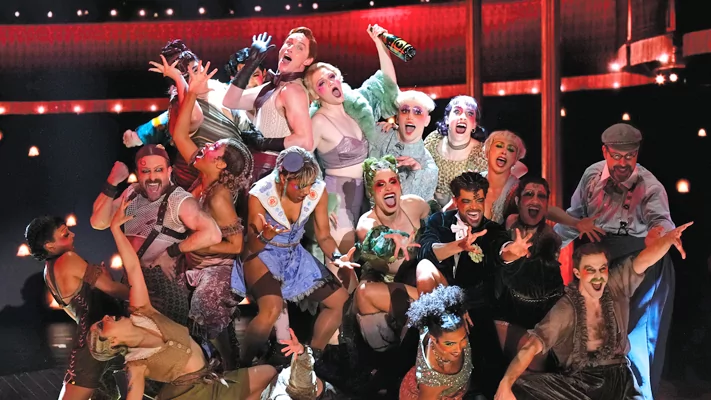
It may also come as a surprise to the relatives, friends, and roommates whom I’ve forced to watch the Tony Awards over the years that this year I didn’t watch until this magazine’s editor asked me to write about the awards show. But while I remain as steadfast a theater lover as ever, I just can’t get excited about the Tonys anymore. And I don’t seem to be the only one. Just 3.5 million people watched the Tonys this year, a 15% decline from last year’s broadcast. That’s only slightly better than 2021’s much-ballyhooed post-pandemic Tonys, which, with fewer than 3 million viewers, was the least-watched broadcast in the show’s history.
To be sure, the Tonys will never post audience numbers to rival the Oscars or the Grammys. But even by Tony standards, this is staggering. In 2016, the year Hamilton swept nearly every category, 8 million people watched the Tonys. And while that was certainly an outlier, it wasn’t that outlandish. In 2013, 7.2 million people watched Kinky Boots defeat Matilda and A Christmas Story for best musical. The following year, 7 million people watched the already-forgotten A Gentleman’s Guide to Love and Murder best Beautiful: The Carole King Musical for the evening’s top award, which in sports terms is like watching LeBron James lose a Hall of Fame spot to a ticket taker.

The merits of certain best musical winners notwithstanding, the question remains: How on earth do you lose 5 million viewers in five years?
It’s not that people suddenly got sick of theater. There were 38 shows running on Broadway in April, 11 of which opened over a single nine-day stretch. With the exception of the 2019-20 and 2020-21 seasons (which were affected by COVID theater closures), gross ticket sales and annual attendance have remained largely steady since 2010, according to the Broadway League.
The cratering interest may be because, as John Podhoretz observed on the June 17 episode of the Commentary magazine podcast, “the Tonys, like all of theater, have gone insanely woke over the last five or six years.”
There’s certainly something to that. The theme of the 2021 Tonys may have been “Broadway’s Back!” But the tone of the evening was more lecture than celebration. In the opening number, Leslie Odom Jr. fired off tortured rhymes about the importance of masks and vaccines. Best Actress winner Adrienne Warren thundered that “The world has been screaming for us to change,” while Kenny Leon, director of best revival of a play winner A Soldier’s Play, began his acceptance speech by repeating “Breonna Taylor” and “George Floyd.” The whole thing was very 2020, and like so much that emerged from that struggle session of a year, it’s strange to watch now.
Like the 2021 Tonys, this year’s ceremony lacked the ebullience of years past. But unlike the 2021 broadcast, this was not the result of a conscious decision to get serious. To the contrary, aside from host Ariana DeBose cheering that “Broadways has been doing the work to become more reflective of society,” no one really talked about politics. A few winners and presenters made vague, bloodless references to our “unprecedented times” and the need for hope and change. But no one’s heart seemed to be in it, and no one appealed to specific social or political causes.
In fact, this year’s Tonys were pretty whitebread. A few people thanked their dads. Two winners thanked God. One thanked a bunch of her former pastors. And yet, the broadcast was still a bore. DeBose’s opening number was an underwhelming slog that even the New York Times called “wrong-footed” and a “strained variety-show knockoff.” While previous Tony hosts peppered Tony broadcasts with self-referential songs and healthy doses of audience participation, DeBose was barely present, awkwardly flubbing her lines and failing to land even the most basic jokes.
Even the seemingly foolproof parts of the evening, an “In Memoriam” montage set to “What I Did For Love” from A Chorus Line and a dance tribute to the late Chita Rivera, felt small, rushed, and underwhelming. Clearly, the Tonys haven’t gotten “woke.” They’ve just gotten bad. And it’s because Broadway doesn’t know what it wants to be.
Look at this year’s Tony nominees. The best play was basically a musical, the best musical was The Outsiders, and the only best musical nominee not based on existing intellectual property was produced by Hillary Clinton. Pretty much every nominated play was helmed by a TV star, and the biggest guest appearance of the night was Jay-Z.
Broadway was once a vibrant, dynamic theater community and understood itself as such. But fueled by the success of shows like Hamilton and Dear Evan Hansen, Broadway decided it was just like Hollywood. It swapped its delightful personalities for pontificating stars and its groundbreaking productions for warmed-over adaptations. Now it’s replaced its once-captivating awards show with a musical version of the Emmys.
Just like Hollywood, Broadway no longer seems to understand its audience. Is it the theater diehards rejoicing that Stephen Sondheim’s Merrily We Roll Along is finally getting its due or budding artists drawn in by the inventiveness of the Sufjan Stevens-scored dance romp Illinoise? Increasingly, it seems like Broadway is simply pandering to the same upper-middle-class tastemakers for whom network execs program late-night talk shows and prestige drama series.
Perhaps Broadway is content to trade the things that once made it unique for the approval of the caftaned ladies of Chappaqua. But so long as they do, I won’t be rushing to watch the Tonys anytime soon. And I’m not the only one.
CLICK HERE TO READ MORE FROM THE WASHINGTON EXAMINER
Tim Rice is a writer and editor in Washington, D.C.






